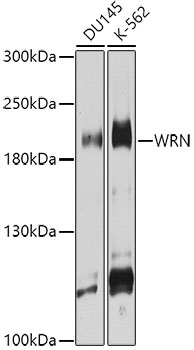Anti-WRN Antibody (CAB6855)
- SKU:
- CAB6855
- Product type:
- Antibody
- Reactivity:
- Human
- Host Species:
- Rabbit
- Isotype:
- IgG
- Antibody Type:
- Polyclonal Antibody
- Research Area:
- Epigenetics and Nuclear Signaling
Description
| 抗体名: | Anti-WRN Antibody |
| 抗体コード: | CAB6855 |
| 抗体サイズ: | 20uL, 50uL, 100uL |
| 申し込み: | WB |
| 反応性: | Human |
| 宿主種: | Rabbit |
| 免疫原: | Recombinant fusion protein containing a sequence corresponding to amino acids 1223-1432 of human WRN (NP_000544.2). |
| 申し込み: | WB |
| 推奨希釈: | WB 1:200 - 1:1000 |
| 反応性: | Human |
| ポジティブサンプル: | DU145, K-562 |
| 免疫原: | Recombinant fusion protein containing a sequence corresponding to amino acids 1223-1432 of human WRN (NP_000544.2). |
| 精製方法: | Affinity purification |
| ストレージバッファ: | Store at -20'C. Avoid freeze / thaw cycles. Buffer: PBS with 0.02% sodium azide, 50% glycerol, pH7.3. |
| アイソタイプ: | IgG |
| 順序: | CQTN SVQT DLFS STKP QEEQ KTSL VAKN KICT LSQS MAIT YSLF QEKK MPLK SIAE SRIL PLMT IGMH LSQA VKAG CPLD LERA GLTP EVQK IIAD VIRN PPVN SDMS KISL IRML VPEN IDTY LIHM AIEI LKHG PDSG LQPS CDVN KRRC FPGS EEIC SSSK RSKE EVGI NTET SSAE RKRR LPVW FAKG SDTS KKLM DKTK RGGL FS |
| 遺伝子ID: | 7486 |
| Uniprot: | Q14191 |
| セルラーロケーション: | Nucleus, nucleolus, nucleoplasm |
| 計算された分子量: | 162kDa |
| 観察された分子量: | 200kDa |
| 同義語: | WRN, RECQ3, RECQL2, RECQL3 |
| バックグラウンド: | This gene encodes a member of the RecQ subfamily and the DEAH (Asp-Glu-Ala-His) subfamily of DNA and RNA helicases. DNA helicases are involved in many aspects of DNA metabolism, including transcription, replication, recombination, and repair. This protein contains a nuclear localization signal in the C-terminus and shows a predominant nucleolar localization. It possesses an intrinsic 3' to 5' DNA helicase activity, and is also a 3' to 5' exonuclease. Based on interactions between this protein and Ku70/80 heterodimer in DNA end processing, this protein may be involved in the repair of double strand DNA breaks. Defects in this gene are the cause of Werner syndrome, an autosomal recessive disorder characterized by premature aging. |
| UniProt Protein Function: | WRN: Multifunctional enzyme that has both magnesium and ATP- dependent DNA-helicase activity and 3'->5' exonuclease activity towards double-stranded DNA with a 5'-overhang. Has no nuclease activity towards single-stranded DNA or blunt-ended double- stranded DNA. Binds preferentially to DNA substrates containing alternate secondary structures, such as replication forks and Holliday junctions. May play an important role in the dissociation of joint DNA molecules that can arise as products of homologous recombination, at stalled replication forks or during DNA repair. Alleviates stalling of DNA polymerases at the site of DNA lesions. Important for genomic integrity. Plays a role in the formation of DNA replication focal centers; stably associates with foci elements generating binding sites for RP-A. Monomer, and homooligomer. May exist as homodimer, homotrimer, homotetramer and/or homohexamer. Homotetramer, or homohexamer, when bound to DNA. Interacts via its N-terminal domain with WRNIP1. Interacts with EXO1, PCNA and SUPV3L1. Belongs to the helicase family. RecQ subfamily. |
| UniProt Protein Details: | Protein type:DNA repair, damage; DNA-binding; Helicase; EC 3.6.4.12; Cell cycle regulation; Nucleolus Chromosomal Location of Human Ortholog: 8p12 Cellular Component: centrosome; cytoplasm; MutLalpha complex; nuclear chromosome, telomeric region; nucleolus; nucleoplasm Molecular Function:3'-5' DNA helicase activity; 3'-5' exonuclease activity; ATP-dependent 3'-5' DNA helicase activity; ATP-dependent DNA helicase activity; ATPase activity; bubble DNA binding; DNA binding; DNA helicase activity; exonuclease activity; four-way junction helicase activity; G-quadruplex DNA binding; helicase activity; magnesium ion binding; manganese ion binding; protein binding; protein complex binding; protein homodimerization activity; Y-form DNA binding Biological Process: base-excision repair; cell aging; cellular response to starvation; DNA metabolic process; DNA replication; DNA synthesis during DNA repair; double-strand break repair; multicellular organismal aging; nucleolus to nucleoplasm transport; positive regulation of hydrolase activity; protein sumoylation; regulation of apoptosis; replication fork processing; response to DNA damage stimulus; response to oxidative stress; response to UV-C; strand displacement; telomere maintenance; telomere maintenance via recombination Disease: Werner Syndrome |
| NCBI Summary: | This gene encodes a member of the RecQ subfamily and the DEAH (Asp-Glu-Ala-His) subfamily of DNA and RNA helicases. DNA helicases are involved in many aspects of DNA metabolism, including transcription, replication, recombination, and repair. This protein contains a nuclear localization signal in the C-terminus and shows a predominant nucleolar localization. It possesses an intrinsic 3' to 5' DNA helicase activity, and is also a 3' to 5' exonuclease. Based on interactions between this protein and Ku70/80 heterodimer in DNA end processing, this protein may be involved in the repair of double strand DNA breaks. Defects in this gene are the cause of Werner syndrome, an autosomal recessive disorder characterized by premature aging. [provided by RefSeq, Jul 2008] |
| UniProt Code: | Q14191 |
| NCBI GenInfo Identifier: | 322510082 |
| NCBI Gene ID: | 7486 |
| NCBI Accession: | Q14191.2 |
| UniProt Secondary Accession: | Q14191,A1KYY9, |
| UniProt Related Accession: | Q14191 |
| Molecular Weight: | 162,461 Da |
| NCBI Full Name: | Werner syndrome ATP-dependent helicase |
| NCBI Synonym Full Names: | Werner syndrome RecQ like helicase |
| NCBI Official Symbol: | WRN |
| NCBI Official Synonym Symbols: | RECQ3; RECQL2; RECQL3 |
| NCBI Protein Information: | Werner syndrome ATP-dependent helicase |
| UniProt Protein Name: | Werner syndrome ATP-dependent helicase |
| UniProt Synonym Protein Names: | DNA helicase, RecQ-like type 3; RecQ3; Exonuclease WRN (EC:3.1.-.-); RecQ protein-like 2 |
| Protein Family: | Werner syndrome ATP-dependent helicase |
| UniProt Gene Name: | WRN |
| UniProt Entry Name: | WRN_HUMAN |


